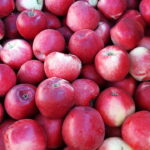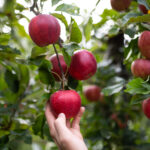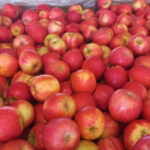Half of Russia opposes decree to destroy illegal food imports

A recent poll shows Russian citizens have not taken kindly to a government decision to destroy foodstuffs banned under the country's retaliatory economic measures against the U.S., Canada, the EU, Norway and Australia. 
A national poll conducted by the Levada Center found 48% of respondents thought negatively about the policy while 40% were in favor, and in Moscow only 23% supported the move.
However, the majority of Russians still support the embargo, but the percentage has dropped by 10 percentage points year-on-year to 68%.
When given a range of options about what to do with illegal foodstuffs confiscated at border checkpoints, 43% of Russians thought it would be a good idea to send them to children's homes and shelters, while other possibilities were also considered including transfers to pensioners and the disabled (41%); charities (27%); deliveries to Donbas (24%); feeding starving people in Africa (12%); and using the food to make fertilizer or feed for livestock (10%).
With the question framed along these lines, only 15% of respondents chose the option 'destroy'.
The survey covered a rural and urban population of 1,600 people aged 18 and over, from 134 settlements and 46 regions. Levada has estimated the margin of error was no greater than 3.4%.
The results are in line with a recent proposal from Russian Communist Party lawmakers, who TASS reported had prepared a bill to allow confiscated foodstuffs to be distributed to the needy and to be used for humanitarian aid purposes. However, State Duma Economic Policy Committee head Anatoly Aksakov told the publication he considered the bill unviable.
"With all the positive rhetoric, which may unfold around this law, if you see things in a realistic light, it turns out that it is unviable," Aksakov was quoted as saying.
"If you begin to get to the heart of the matter, it turns out that there is no alternative, as these goods are without a source of origin, without proper certification, they are brought to the country with fake documents.
"It seems that it's hard to escape a conclusion that [these goods should be sent to] orphanages and residential care homes, but in the event of the fatal outcome (God forbid) or harm to health a question arises who will be held accountable."
Yesterday - on the day the Russian embargo was expanded to include Albania, Montenegro, Iceland and Liechtenstein, as well as Ukraine on special terms - the country's food watchdog said a shipment of around 4.5 metric tons (MT) of fruits from Spain, Italy and the Netherlands had been destroyed.
The consignment included Spanish lemons, Italian grapes and Dutch apples.
In a separate note, the authority said 488MT worth of banned products had been destroyed between August 6-13, 2015.














































